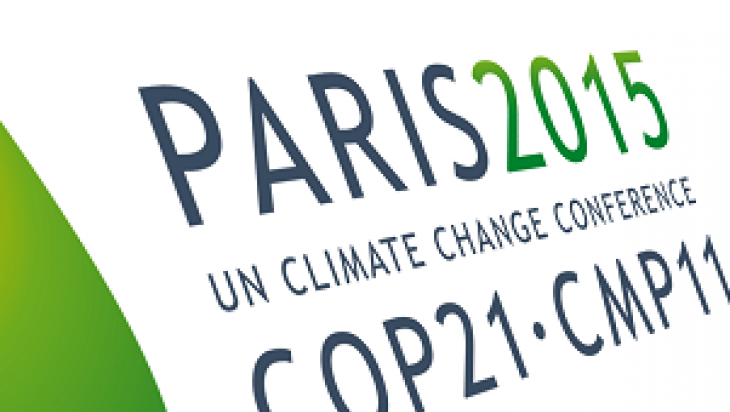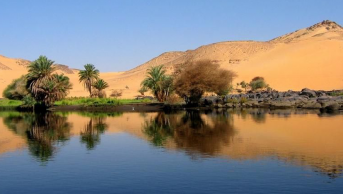On the Eve of Entry into Force: Paris Agreement and the Middle East

The UN has recently declared “the Paris Agreement will enter into force on 4 November 2016, thirty days after the date on which at least 55 Parties to the Convention accounting in total for at least an estimated 55 % of the total global greenhouse gas emissions have deposited their instruments of ratification, acceptance, approval or accession with the Depositary.”Many would agree that this statement represents a historic step in global climate change politics, which was made possible by European Union’s ratification of the treaty last week.
While Europe, or technically the European Union is championing a stricter climate regime globally, the status of Middle East just across the Mediterranean is rather debatable. It is ironic that the next Conference of the Parties will take place in the Middle East, namely Marrakech, Morocco later this year; many countries in the region are lagging behind what was achieved through the Paris process. And, very importantly, origins of this lag is a common output of quite divergent sets of interests.
When one looks at the current status of ratification (almost a year after signing of the Agreement), s/he recognizes that the Paris Agreement has nearly reached a universal coverage concerning “signature”. As of early October, 191 countries have signed the Agreement. Although this demonstrates an optimistic outlook for the Agreement in general, a closer look in the position of Middle Eastern countries would show a different picture. Iraq, Saudi Arabia and Syria, all of which are United Nations Framework Convention on Climate Change (UNFCCC) members, did not sign the Agreement until now. These countries represent more than 1.2 percent of the global emissions. Two of them are significant oil producers while Syria –amid a prolonged civil war- could have been preoccupied with more pressing issues, and been unable to devote necessary time and effort to deal with what Paris Agreement brings about. Other non-signatories (UNFCCC members) are Nicaragua, Niue and Uzbekistan which account for 0.58 percent of the global emissions. Uzbekistan –which can be thought of a part of the so called “greater Middle East”- solely accounts for 0.54 percent.
As regard to the “ratification”, only three Middle Eastern countries have ratified the Agreement so far: Morocco, Palestine and the United Arab Emirates. Morocco has long been a supporter for a stronger global climate change regime. Next month, Morocco will be hosting a COP meeting, which will be a second time event for this country. For Palestine, there will be no notable issues at stake during the implementation of the Paris Agreement. The real surprise here is the United Arab Emirates, which earns bulk of its state revenues from oil extraction and exports, which will be under more pressure as the implementation of the Agreement proceeds.
In essence, the Paris Agreement does not entail a direct and/or imminent threat to oil exporters of the Middle East (or elsewhere)The aim of the Agreement has been stated as to enhance the implementation of the UNFCCC through: "(a) Holding the increase in the global average temperature to well below 2 °C above pre-industrial levels and to pursue efforts to limit the temperature increase to 1.5 °C above pre-industrial levels, recognizing that this would significantly reduce the risks and impacts of climate change;(b) Increasing the ability to adapt to the adverse impacts of climate change and foster climate resilience and low greenhouse gas emissions development, in a manner that does not threaten food production;(c) Making finance flows consistent with a pathway towards low greenhouse gas emissions and climate-resilient development." However, all these rather broad targets will –in time- be translated into political decisions and actions which will ultimately aim at reducing the use of fossil fuels, seemingly number one culprit of the global climate change. In brief, it becomes less shocking when oil exporters tend not to sign or ratify the Paris Agreement.
But what about other Middle East countries, many of which are not selling oil? Here, the popular view is that stricter climate change policies will become an impediment to growth. Very few countries hitherto started to perceive this is not straightforward.
There is a growing consensus among economists and other relevant experts that in the long run adaptation to global climate change (and its political regime) will make growth more likely. Even in the medium term, the “adapters” will gain from the process through raising their ranks in global competitiveness indexes. The ever-growing awareness in climate change politics has triggered a process of “convergence” whereby all countries and companies will be forced to either follow the same route towards more climate-proof structures, or reach the common aim of climate-resilient business and policy making.
The United Arab Emirates’ (UAE) timely decision to ratify the agreement ahead of any other oil producing Middle East country should be read within such context.It is a visionary move from a truly economic perspective (not to mention the accompanying political prestige): It will be less costly for those who start climate adaptation earlier. Pioneering climate adaptation can open up new horizons for the UAE and such countries in lucrative areas likeinnovation transfers. Middle Eastern countries should embark upon preparations for a post-oil world scenario which is full of new ways of sustainable development.










